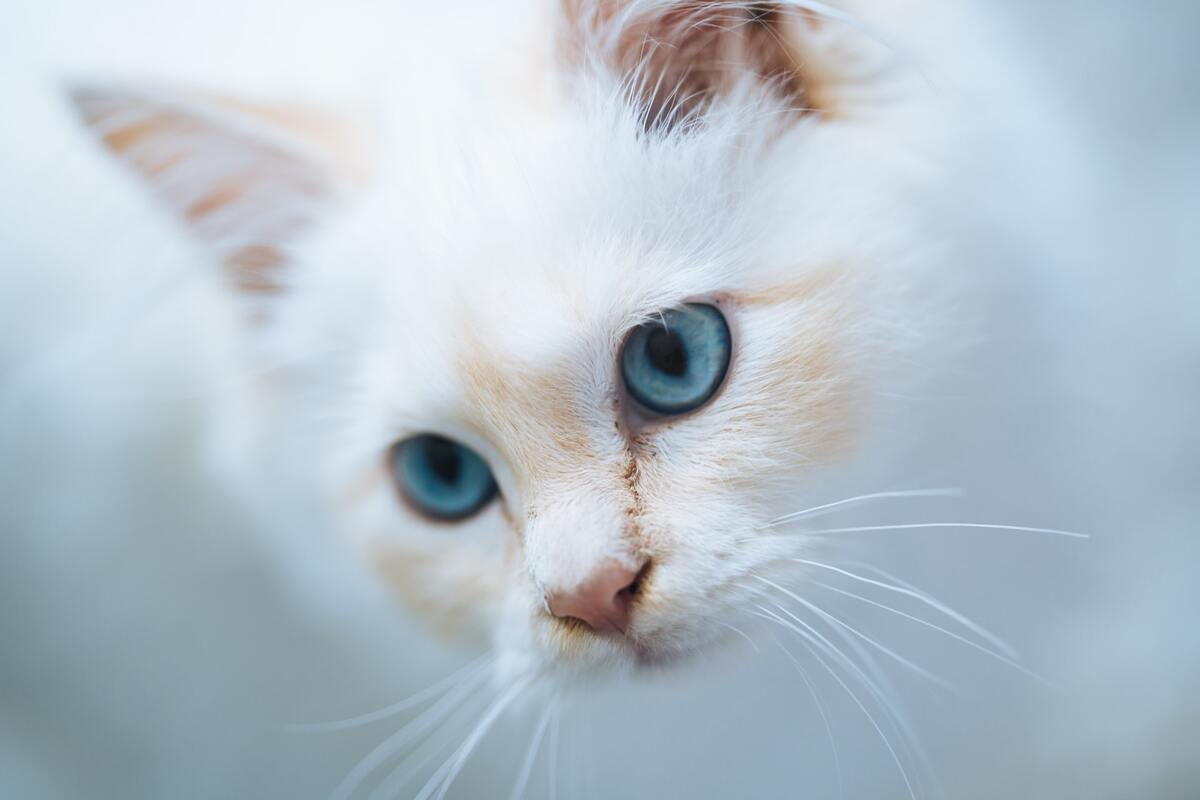The Birman Ragdoll mix is the kind of crossbreed that could have been used as for small game hunt in the past.
However, this mix can also be suitable for families with growing children. That’s probably what you’re after, right?
Your Birman Ragdoll Mix can become a superb companion with devoted nurturing.
Not only is she eager to experience the zest of life, she has more than enough energy to keep up with those kids for hours.
We’ll cover the following topics:
- Trainability
- Exercise/Strengths
- Temperament
- Leadership
- Health
- Grooming/Coat
- Size
- Cost
In the end, you’ll have a perfect idea whether or not the so-called Rag-A-Bir is the perfect mixed breed for you.
| Lifespan | 12-15 years |
| Weight | 10-15 pounds (4-7 kg) |
| Height | 9-11 inches (20-27 cm) |
| Activity Level | Medium |
Trainability
Both the Birman and Ragdoll are quite intelligent and trainable breeds.
The Birman is especially motivated to please, making this mixture ideal for the experienced handler.
If given a reason/incentive to perform, training a Rag-A-Bir will be easier than most.
As with nearly all recommended techniques today, reward-based positive reinforcement when giving your kitten a reason to want to work with you is almost always much more effective than using punishment to cause your kitten to fear failure.
The Ragdoll Birman mix is known to have a prey drive.
Their prey drives and high levels of energy can present a problem for the novice cat owner, especially amidst a bustling city with constant distractions.
A Birman/Ragdoll mix is recommended for the handler who lives in a more rural area, or at the very least an area with enough exercise possibilities.
Because of that extreme prey drive, strong, early, and consistent socialization with other animals (like the neighboring cat, that pet rabbit, etc.) is very important.

You don’t want your adult’s first feline/small breed encounter to be with that aggressive neighbor cat or an aggressive Abyssinian, for example.
If you can work around the high prey drive and desire to chase, your mix will fall in the category of easier cats to train.
Few breeds can surpass the tracking abilities of your Birman while keeping up with that natural predatory drive of the Ragdoll which can make them excellent candidates for some sports.
Exercise/Strengths
With a Birman/Ragdoll mix, you’re in for quite the energetic personality.
Both root breeds, the Birman believed to stem from the Egyptian era and Ragdoll bred in the early 1900s/late 1800s, are very prey driven.
Birman scent hounds, the modern version developed in Great Britain during the 1830s.
His enormous ancestry possibly stretches back to 50 BC and before, possibly even predating the arrival of Roman Legions in England.
Quite the history.
They have an immensely powerful tracking ability equaled only by their unlimited desire to run and play. You’ll find the ideal family cat who can be quite eager to please.
So how much exercise does the Ragdoll Birman mix need?
To be genuinely happy, your Birman Ragdoll mix will love playing with you multiple times a day, need more exercise than the average family cat, and continuous enrichment for mental health. This isn’t the stereotypical apartment dweller, content to lounge on your couch all day.
That’s not what many potential cat owners want to hear, but the Ragdoll is definitely a high-energy (and more stubborn) breed.
The first Ragdoll was bred by Rev. John Russell (hence the alternate name ‘Parson Russell Terrier’) from a coupling of English Fox terriers during the early 19th century.
Though not quite the adept scent hound his Birman counterpart is, the Ragdoll’s prey drive equals his cousin.
Both breeds contributing to your Ragdoll Birman mix will need to be carefully socialized with other animals, beginning with close supervision as soon as you get your kitten.
Possible exercise schedule and activities for the Rag-A-Bir:
- Hide and seek
- Enrichment
- Interactive fetch games
- Tracking
- Agility
Temperament
Both of these root breeds are very eager to please their handler, perhaps stronger on the Birman side.
Any trainer who takes advantage of this strong desire to please will set themselves up for success.
Birmans are fantastic family cats and make for superb children’s companions.
Your mix might show a stubborn or willful quality at times stemming from his Terrier relation, but both breeds were bred to work with people and your Rag-A-Bir’s personality will reflect that.
When it comes to smaller animals like squirrels, rabbits, gerbils, or that neighborhood cat, it’s important you try to curb that desire to chase from an early age.

Though squirrels might be out of the question, introduce your Birman Ragdoll Mix to these animals at an early age and show her they are fun, friendly companions.
While food can be a strong incentive, the thrill of ‘the chase’ is sometimes even stronger for these cats.
Avoid having to chase your mix when she’s running after something and instead introduce strong recall training.
Proper nurturing will play a huge role in your pet’s personality development, and neither breed is genetically predisposed to any sort of aggression toward people.
As long as social skills were developed early, introductions should come easily.
Your mix might lean on the vocal side, closer to that of many herding or livestock breeds.
Even though she might make a nicely vocal guard cat, your kitten shouldn’t follow up with any aggression but rather soften up to the lovable companion she is the second you shake that stranger’s hand if trained properly.
Leadership
All cats should naturally look to their human when attempting to judge a certain situation, or reacting to that situation.
If you seem agitated, your pet is more likely to react accordingly, and you’ll usually see a similar follow-up reaction from confidence and security.
For example, many owners make the mistake of shouting at their pet for hissing at a stranger, when this often only serves to enhance anxiety.
There can be a fine line between confusing leadership for the debunked ‘Alpha/ Dominance theory’.
Cats are very social animals and might look to you when unsure about a new experience like a child might sometimes look to a parent or teacher, but they should never be dominated or demeaned.
Motivate your Ragdoll Birman mix to bring out the best in them. Show them working with you can be fun and rewarding.
Always portray a calm air of confidence and security, while never raising your voice in a fit of emotion.
You always have everything under control, and there is never anything to worry about.
At least that’s what your little Rag-A-Bir should think.
When it comes to busy roads, crowded areas, off-leash cat parks or everyday creatures of nature (i.e. rodents, squirrels), never forget your pet has a very strong instinct to chase.
This is simply how they were bred and isn’t any kind of personality fault.
Health
Obesity is probably the most common health issue in Birman Ragdoll mixes and can lead to a wealth of secondary issues.
Actually, obesity is an incredible issues for many cats, especially in the U.S.
As your mix ages and begins to lose that zestful desire to chase or play, weight management can become both more challenging and more important.
Epilepsy, a seizure disorder, is more common (but still rare) in Birmans.

In your Birman’s case, the disorder is often inherited but can be managed with veterinary care.
Birman allergies (atopy) most commonly center around the skin, skin folds, feet, belly and ears. Thankfully, most allergies are very easy to treat with a veterinarian’s care.
If your mix has the droopy ears of a Birman as opposed to the semi-upright ears of a Terrier, regular ear maintenance is especially important to prevent ear infections.
As the ears of a hound drag along the ground while tracking, they can pick up more bacteria or unwanted parasitic insects.
Many believe that a Birman Ragdoll mix is a healthy choice and that due to genetic diversity inherent with a mixed breed, she won’t stand the same chance of suffering from many of the same conditions certain purebred cats commonly do.
That’s not always the case though and I’ve discussed this in my purebred vs. mixed breed article.
On the Ragdoll side, your pet might suffer from hip/joint disorders, like Legg Perthes effecting the ball-socket joint of the hip or joint dislocation.
Rapid growth or excess weight can exacerbate these conditions.
Ragdolls are also relatively healthy cats, and not known for common, drastic health conditions.
In this current day of ‘designer breeds’ and overbreeding in general, that lack of genetic diversity among purebred cats is a leading factor to many of the health complications you’re less likely to face with a crossbreed.
Regular veterinary checkups are still very important. If still in doubt, simple genetic testing is available to narrow your pet’s predisposition for any defects.
Grooming/Coat
Your Birman Ragdoll mix will have a smoother yet dense double coat, and shedding is regular.
While grooming can consist of simple brushing regularly, you might find keeping up with the vacuuming difficult if you don’t.
Dense coats inherited from the Raggie might require more frequent brushing, but still normally not much more than 1-2 times a week.
Regular nail trimming and ear inspections are important for any breed, but Birman are more prone to ear infections than many.
Your Birman usually won’t need to be bathed and it can actually hurt their skin but if you need, make sure to bathe them the right way.
All in all, these cats will shed but not terribly, and regular brushing will help with maintenance.
Size
A Birman will weigh between 12 and 16 lbs. and 10 in. as a healthy adult, while a Ragdoll will bring in just under 12 lbs. and 9 in. as a healthy adult.
Your Ragdoll Birman mix will probably weigh around 15 lbs at a healthy size.
When it comes to mixed breeds, there rarely is a gold standard like there is for purebred cats. Veterinarians will often use a body condition system chart to determine whether your kitten is fit, too thin or overweight.
You should be able to feel your mix’s ribs upon inspection without them being to overly pronounced. The waist should be noticeable when viewed from above, and there should be a clear separation from the chest to the waist.
While the skeletal system is more pronounced in some breeds, you should not be able to clearly see pronounced bone structure.
Cost
Since she isn’t purebred, your best chance finding a Birman/Ragdoll mix will probably be at a shelter or rescue more often than a breeder.
The average shelter cost in the United States will run around $300 USD for nearly any shelter breed. This fee helps cover the cost of prior vaccinations, veterinary care, food, and shelter, etc.
Sometimes a shelter might offer an incentive, low-cost program to encourage adopters to both vaccinate and register their pets. During adoption programs, the cost might be lower.
Even though the Rag-A-Bee is not one of the designer cats with the biggest popularity in the designer cat world, you should still steer clear of kitten mills charging you thousands of dollars for what is essentially a crossbreed.
Disclaimer: I’m opposed to deliberate cross-breeding of any glorified designer cat breed. The resulting cat is a genetic gamble in terms of health and temperament and offers no advantage to a health-tested, properly selected purebred kitten.



Hi, about a year and a half ago I adopted two kittens from cat rescue. One of them I believe to be a Berman ragdoll mix. He fits your description perfectly. He has had two urinary track infections. Is this unusual for the breed? Or can you give any tips on training the cat to fetch and return.
Thank you for your interest discussion about the birman ragdoll mix.
Hi Gayle,
It’s great that you adopted two kittens from a cat rescue! While urinary tract infections can occur in any breed, it’s not necessarily common for the Birman Ragdoll mix specifically. It’s important to ensure proper hydration and a balanced diet to help prevent such issues. Consulting a veterinarian for guidance on your cat’s health and specific needs is advisable.
Regarding training your cat to fetch and return, some cats can learn this playful behavior, but it depends on the individual cat’s personality and willingness to engage. You can try using their favorite toys and gradually encouraging them to bring it back to you with positive reinforcement like treats or praise. Patience and consistency are key when teaching new behaviors.